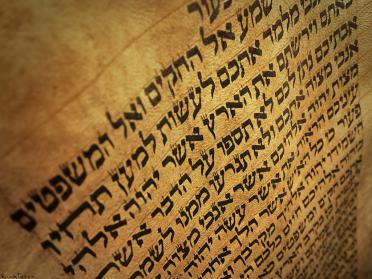Every week, parshaoftheweek.com brings you a rich selection of material on parshat hashavua, the weekly portion traditionally read in synagogues all over the world. Using both classic and contemporary material, we take a look at these portions in a fresh way, relating them to both ancient Jewish concerns as well as cutting-edge modern issues and topics. We also bring you material on the Jewish holidays, as well as insights into life cycle rituals and events...
I’ve been watching The Handmaid’s Tale with my wife – we’re about at the middle - and I’m being seriously challenged. We are both finding it hard to take, (Iris is threatening to bail but I think she’ll stick with it) and I want to share with you some of the issues it’s raising for me.
One of the most troubling is the misuse of religion, and religious texts (mostly from our Torah, which these Christians, as Lewis Black has so eloquently and forcefully explained, really should leave alone) in the name of raw, abusive, murderous power and self-interest. I can’t help but think about the current state of affairs in the Orthodox world (my world), and the many examples of this kind of manipulative behavior: using religion for personal advantage, as a platform for financial gain, power, abuse, and worse. The really outstanding cynicism of the religious/political leadership in The Handmaid’s Tail is perhaps out of the ordinary, but probably not.
The other thing that I find thought-provoking about the series is the incessant, dehumanizing curtailment of personal freedom, again, in the name of religion. The Trump parallels are obvious – I think America, given a certain set of circumstances, could be inches a way from martial law and fighting in the streets – but it is the question of freedom and religion, or freedom within religion, which I’m interested in here.
This week’s parsha, Chukkat, contains a classic “irrational, arbitrary” divine commandment: the laws of the red heifer. Briefly, the ashes of a red heifer, with some added water, are used to purify the ritually impure. The Rabbis see this as arbitrary: Why a heifer? Why water? Why the seven-day ritual? How does it purify? Why does the officiating priest then become impure? The law is seen as an example of what is called in Hebrew a Chok – a law which we do not understand, which, to us, makes no sense.
This Shabbat, dozens, if not hundreds, of Rabbis will be using this law and the category of chok to stress notions of obedience, surrender to God’s commandments, and accepting that God’s will and wisdom override our intellect, our human understanding. I’ve already seen a couple of pieces stressing surrender, obedience, and our inability to fathom God’s will, or God forbid, challenge it. Or, double God forbid, change it.
To which I say: hell, no! The first real interaction between a human being and God, the first conversation, was when Avraham challenged God’s decision to kill the residents of Sodom. I will say that again: The first real interaction between a human being and God, the first conversation, was when Avraham questioned God’s decision to kill the residents of Sodom. We are NOT meant to obsequiously accept God’s will; we are meant to challenge it. This is what the Rabbis of the Talmud do, with every creative reading, every clever erasure or amendment or adjustment of laws which they felt were immoral or unreasonable (the list is too long; write me if you are interested). Yes, there are chukkim, statutes whose precise meaning and particular details escape us – but our job is to try and figure them out! As Maimonides says – it’s a sickness to think that the more unreasonable, illogical, unfathomable a law is, the holier it must be. A sickness. And then he goes on to postulate any number of reasonable (not always so compelling or exciting, or definitive, but reasonable) explanations for many of these chukkim, these supposedly illogical, unknowable laws. But this is NOT done when the strangeness or difficulty concerns a law’s apparent immorality, or unfairness. When that happens we really deal with it; reframe it, reinterpret it, or legalistically shrink and contextualize it out of existence. That’s what Jews do, what the Rabbis have always done. Because what God does is free us, first by taking us out of Egypt, and then by giving us the living, breathing, Torah. “Don’t read it as ‘engraved on the tablets’; read it as ‘there is freedom on those tablets’”. He did not, and does not want to, enslave us.
Shabbat Shalom,
Shimon



Get inspired by Chukat Divrei Torah from previous years